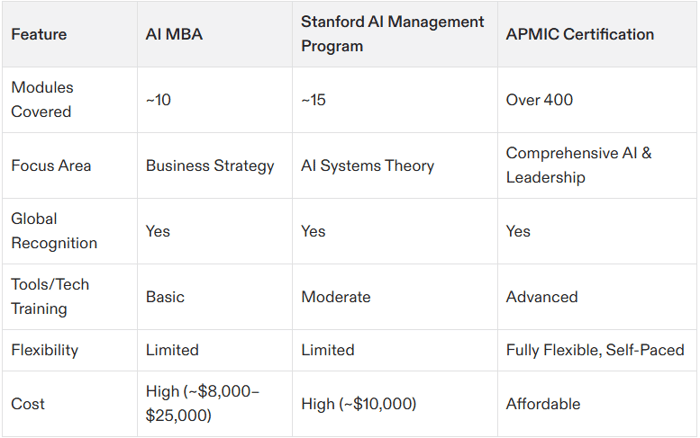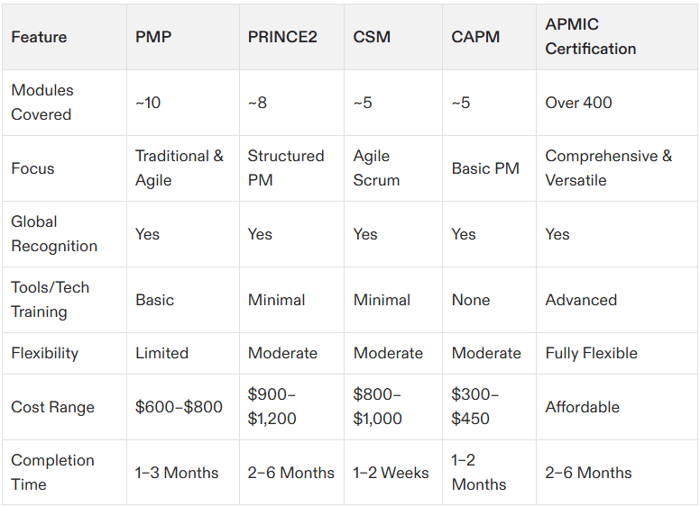Table of Contents
- Why Healthcare Needs Specialized Project Management Certification?
- Benefits of Project Management Certification Healthcare
- Top Healthcare Project Management Certifications
- 1. APMIC Healthcare Project Management Certification (Best for Industry-Specific Training & Career Growth)
- 2. Certified Healthcare Project Manager (CHPM) (Best for Beginners)
- 3. Project Management Professional (PMP) (Best for Generalized Knowledge)
- 4. PRINCE2 Practitioner (Best for Structured Approaches)
- 5. Lean Healthcare Certification (Best for Process Optimization)
- Choosing the Right Certification for You
- 10 Less Commonly Known but Essential Insights for Healthcare Project Managers
- Certification Comparison Chart
- Final Thoughts: Why APMIC is Your Best Bet for Success
- FAQs About Project Management Certification Healthcare
Why Healthcare Needs Specialized Project Management Certification?
The healthcare industry is evolving rapidly, driven by technology, regulatory changes, and the need for efficiency. Managing projects in this high-stakes environment requires precision, adaptability, and specialized expertise. A healthcare project management certification isn’t just a credential—it’s a career-defining advantage that equips professionals with the tools to streamline operations, ensure compliance, and drive innovation. Advance your career with a healthcare project management certification and gain industry-specific expertise in 2025.
What is a Healthcare Project Management Certification?
A project management certification for healthcare is a specialized program that combines traditional project management principles with healthcare-specific knowledge. Unlike general certifications, these programs address:
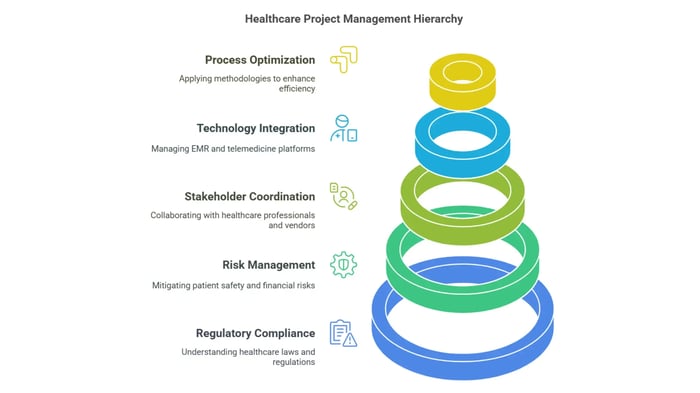
Regulatory Compliance: Understanding HIPAA, GDPR, and local healthcare laws.
Risk Management: Mitigating patient safety risks, financial risks, and IT security threats.
Stakeholder Coordination: Working with medical professionals, administrators, IT teams, and vendors.
Technology Integration: Managing electronic medical records (EMR), telemedicine platforms, and AI-driven solutions.
Process Optimization: Using Lean, Six Sigma, and Agile methodologies to improve patient care and operational efficiency.
Why 2025 is the Best Time to Get Certified
In 2025, the demand for healthcare project manager certification holders is at an all-time high. The healthcare industry faces new challenges such as AI-driven diagnostics, virtual care expansion, and cybersecurity threats in medical data management. Certification ensures you stay ahead of industry shifts while positioning yourself as a leader in healthcare project management.
Benefits of Project Management Certification Healthcare
A Project Management Certification Healthcare offers a range of career-boosting advantages. Here’s how it can make a difference in your career and organization:
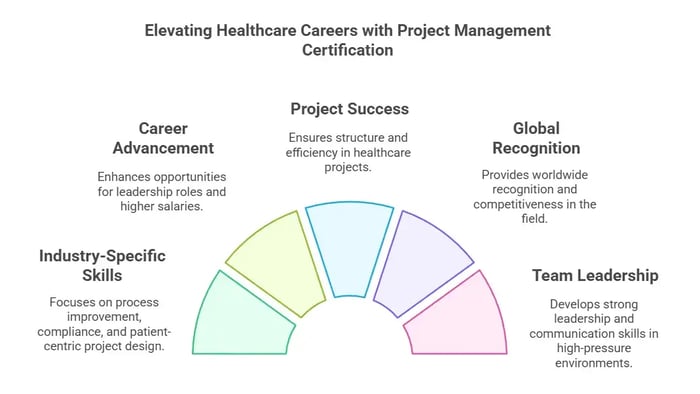
1. Industry-Specific Skills
Healthcare certifications focus on process improvement, compliance, and patient-centric project design. For example, the APMIC Certification offers over 400 modules covering advanced topics tailored for healthcare, such as clinical project management and patient safety standards.
2. Career Advancement
Organizations prioritize candidates with certifications because it shows proven expertise. Certified project managers in this sector are more likely to land leadership roles and are often paid substantially more than their non-certified peers.
3. Greater Success in Healthcare Projects
Certified professionals bring structure and efficiency to projects like new hospital constructions, pharmaceutical launches, or public health campaigns, increasing the chances of timely and successful outcomes.
4. Global Recognition
Programs such as APMIC Certification and PMP are recognized worldwide, making you a competitive candidate for healthcare project management positions globally.
5. Enhanced Team Leadership
High-pressure environments like hospitals require strong leadership. Certification equips you with robust stakeholder communication frameworks and leadership techniques.
Top Healthcare Project Management Certifications
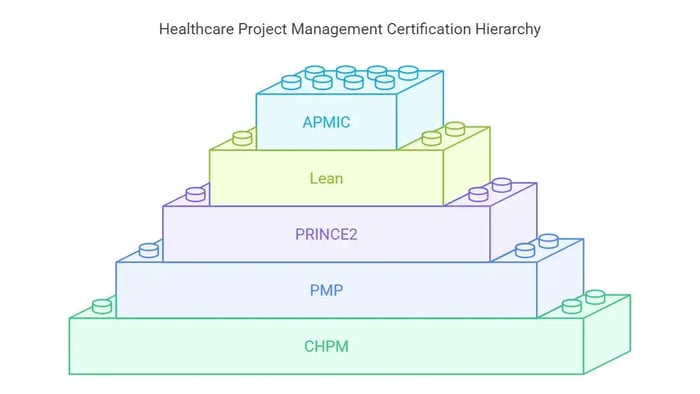
1. APMIC Healthcare Project Management Certification (Best for Industry-Specific Training & Career Growth)
APMIC’s certification is designed specifically for healthcare professionals. It offers:
400+ Modules covering healthcare IT, risk assessment, and compliance management.
Agile and Lean Methodologies for hospital operations and process improvement.
Flexible Learning with self-paced online modules.
Career Support to connect graduates with top employers.
Ideal for mid-to-senior level professionals, this certification is the most comprehensive healthcare-specific project management program available in 2025.
2. Certified Healthcare Project Manager (CHPM) (Best for Beginners)
Focus: Entry-level professionals looking to transition into healthcare project management.
Curriculum: Operational workflows, hospital resource management, and compliance basics.
Duration: 3–4 months.
3. Project Management Professional (PMP) (Best for Generalized Knowledge)
Focus: Traditional project management methodologies applicable across industries.
Key Topics: Budgeting, scheduling, and stakeholder communication.
Duration: 6 months.
4. PRINCE2 Practitioner (Best for Structured Approaches)
Focus: Multi-departmental and international healthcare projects.
Key Topics: Resource and budget optimization, process-based project management.
Duration: 2–3 months.
5. Lean Healthcare Certification (Best for Process Optimization)
Focus: Reducing inefficiencies and improving patient outcomes.
Key Topics: Lean principles, waste reduction, and value-driven healthcare strategies.
Duration: 8–12 weeks.
Choosing the Right Certification for You
Selecting the right healthcare project management certification depends on your career level, industry focus, and long-term goals. Entry-level professionals may benefit from certifications like Certified Healthcare Project Manager (CHPM), which covers hospital operations and compliance basics. Mid-to-senior level professionals seeking healthcare IT integration, AI-driven project management, and regulatory expertise may find APMIC’s Healthcare Project Management Certification more suitable.
Those working on structured, multi-departmental projects may prefer PRINCE2 Practitioner, while Lean Healthcare Certification is best for professionals focused on process optimization and efficiency. Evaluating the curriculum, duration, and industry recognition of each certification will help you make an informed decision aligned with your career aspirations.
Certification | Best For | Key Features | Duration |
APMIC | Mid-to-senior level professionals | Healthcare IT, Agile methods, Compliance | 4–6 months |
CHPM | Entry-level professionals | Hospital operations, compliance | 3–4 months |
PMP | General project management | Budgeting, Scheduling | 6 months |
PRINCE2 | Multi-departmental projects | Resource & budget optimization | 2–3 months |
Lean Healthcare | Process improvement | Lean principles, Efficiency | 8–12 weeks |
For those serious about advancing in healthcare project management, APMIC is the standout choice due to its industry-specific curriculum and career-focused approach.
10 Less Commonly Known but Essential Insights for Healthcare Project Managers
Clinical Trial Management – Certifications like APMIC teach how to manage trials efficiently.
Interoperability Standards – Knowledge of HL7 and FHIR standards is crucial for IT-driven healthcare projects.
Value-Based Care Models – Understanding cost vs. outcome frameworks enhances project success.
Digital Transformation Strategy – AI, blockchain, and cloud computing are reshaping healthcare.
Public Health Policy Integration – Pandemic response planning and policy compliance are key areas.
Emergency Preparedness – Managing disaster response and hospital surge capacity.
Patient-Centric Design – Projects must align with patient experience and care models.
Healthcare Finance & Grants – Funding structures impact project feasibility.
Cross-Border Project Management – Telemedicine and international regulations require special handling.
Mental Health & Burnout Management – Healthcare projects must address staff well-being to ensure success.
Certification Comparison Chart
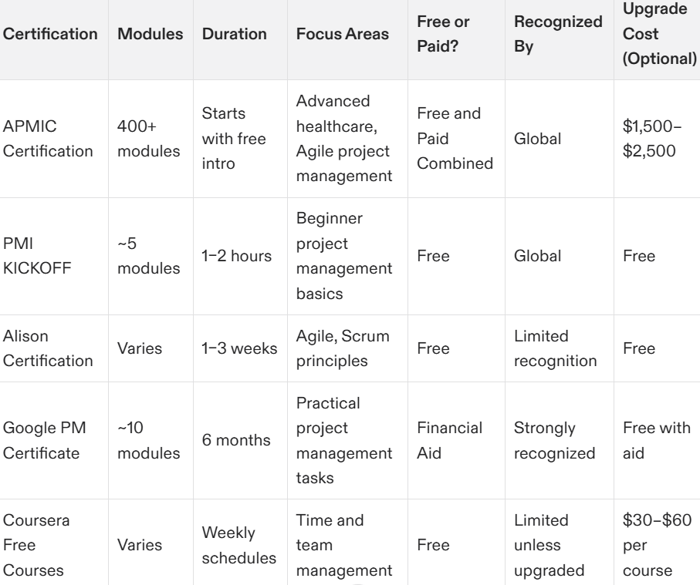
This certification comparison chart provides a side-by-side evaluation of key certifications available for healthcare project managers. It highlights essential factors like certification name, modules, duration, focus area, free or paid, recognized by, and upgrade cost comparisons.
Final Thoughts: Why APMIC is Your Best Bet for Success
With increasing demand for healthcare project manager certification, professionals need an edge to stand out. APMIC’s Healthcare Project Management Certification is the most comprehensive program tailored specifically for healthcare professionals.
Learn real-world applications of project management in hospitals, clinical research, and health IT.
Master compliance regulations, AI integration, and patient-centered project frameworks.
Access career support and networking opportunities to land high-paying roles.
For a comprehensive understanding of the PMP certification process, including application procedures and examination details, refer to the official PMP Handbook provided by the Project Management Institute.
Additionally, the Healthcare Project Management, Third Edition textbook by Kathy Schwalbe offers in-depth insights into managing healthcare projects effectively. A sample chapter is available for download to provide a glimpse into the book's content.
💡 Don’t wait to level up your career. Start your certification today! 🚀
FAQs About Project Management Certification Healthcare
Q1. What is a Project Management Certification in Healthcare?
A project management certification for healthcare is a specialized program designed to develop project management skills while addressing the unique challenges of the healthcare industry. Certifications like the APMIC Certification cover vital topics like compliance, patient-focused management, and healthcare IT systems.
Q2. Who should pursue this certification?
Healthcare professionals in roles such as hospital project managers, IT administrators, clinical trial managers, or public health officials should pursue this certification. It's also beneficial for professionals transitioning into healthcare project management.
Q3. Why is healthcare-specific certification necessary?
Unlike general project management, healthcare projects involve higher stakes, including patient lives, legal compliance, and sensitive data systems, which require focused training.
Q4. How long does it take to earn a certification?
Certification timelines vary. CHPM takes 3–4 months, while PMP extends to 6 months. Flexible programs like APMIC offer a 4–6 month completion timeline.
Q5. Do certifications improve employability?
Yes, certified professionals are often given preference for positions, enjoy higher salaries, and are trusted with leadership roles.
Q6. Can certifications be completed online?
Most certifications, including the APMIC Certification, offer completely online or hybrid learning options, making it convenient for working professionals.



